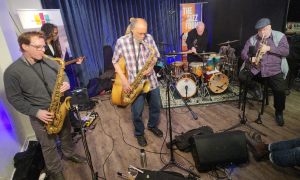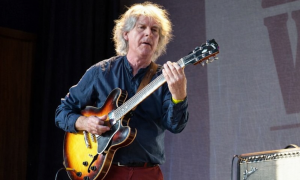Home » Jazz Articles » Live Review » New Universe Music Festival: Day 1, November 20, 2010
New Universe Music Festival: Day 1, November 20, 2010

The New Universe Music Festival
Raleigh, North Carolina
November 20-21, 2010
With so many jazz festivals taking place around the world—and new ones emerging each and every year—just as it's become increasingly challenging, in this world of DIY recordings, for artists to filter through and be heard, how does a new festival find its way into the public eye, to reach fans whose entertainment dollars are being stretched more than ever before?
In the case of Abstract Logix and The New Music Universe Festival, the answer is simple. Beginning as an online music store a decade ago, Abstract Logix has, over the past half decade, emerged as one of the world's biggest advocates for fusion of the broadest possible definition. Starting relatively small, the size of its roster, and corresponding releases, has grown to include fusion giants like guitarist John McLaughlin, bassist Anthony Jackson and drummer Lenny White ; important up-and-comers like guitarist Alex Machacek and drummer Ranjit Barot; and longstanding artists deserving of far greater recognition, including drummer/keyboardist Gary Husband, keyboardist Scott Kinsey, bassist Matthew Garrison, and guitarists Jimmy Herring and Wayne Krantz. 2010 has been the label's biggest year yet, with a slew of powerful and, in many cases groundbreaking new releases.

In the same way that Abstract Logix's growth as a label has, in retrospect, been nothing but inevitable—thanks to the dedication of the label's owner, Souvik Dutta, his wife, Shweta, and store administrator John Angelo—the creation of The New Universe Music Festival was, ultimately, equally inevitable. Its first year brings together many of the artists on its roster, for a two-day event in the label's hometown of Raleigh, North Carolina, and for fans of hard-edged, kick-ass fusion that crosses, and ultimately dissolves, boundaries stylistic, cultural and otherwise, it simply doesn't get any better than this. With a line-up that includes Machacek and his trio (bassist Neal Fountain and drummer Jeff Sipe); Barot's group, featuring the young and stunning electric violinist Bala Bhaskar; Human Element, a new super group with Kinsey, Garrison, percussionist Arto Tuncboyaciyan, and Barot, subbing for the absent Gary Novak; the Jimmy Herring Band; Krantz's trio; The Lenny White Band with Herring as a guest; and John McLaughlin and The 4th Dimension, there's more than enough muscle to satisfy fans of high octane, high energy electric jazz. And with a grand finale all-star jam, as a tribute to McLaughlin, there will be a once in a lifetime opportunity to see even more cross-pollination than already happens amongst a roster of musicians that, hanging with them during the soundcheck for the first day, feels more like a family than the broad collection of players it represents.
As Herring put it backstage, before the first evening at the Lincoln Theatre, this is "Real music played by real people," and the hundreds of eager fans that collected in the largely standing-room venue, were more than pumped as they entered the hall, where they were first met by a listening party that brought Krantz and Barot together onstage, to talk about their respective records, Krantz Carlock Lefebvre (Abstract Logix, 2009) and Bada Boom (Abstract Logix, 2010). Barot spoke of the circumstances surrounding the recording of Bada Boom, and how some of the songs were constructed; Krantz spoke less, but with a dry sense of humor as, following Barot's discussion of using a gospel choir at the end of one of his tracks, the guitarist introduced one of his own, simply: "I suppose it should be said that you're not going to hear a gospel choir on this track."
The half-hour listening party was an unusual but engaging way to prime the audience for the music to come, putting them in the mood so that when the first act hit the stage, they were beyond ready: they were pumped, vocal and clearly energized.
Chapter Index
Alex Machacek
Since the release of [sic] (Abstract Logix, 2006), Austrian-born but now Los Angeles-based Alex Machacek has proven himself a multiple-threat. A stunningly virtuosic guitarist, emerging from the shadows of Allan Holdsworth by taking many of the iconic guitarist's signatures and expanding on them to gradually create his own distinct voice, Machacek is also a complex composer capable of incredible detail in longer form. [sic] featured compositions that were built around drum solos from ex-Frank Zappa percussionist Terry Bozzio, but for his latest release, 24 Tales (Abstract Logix, 2010), Machacek has composed a truly epic piece around a 52-minute drum solo from another emergent marvel, Marco Minnemann. Minnemann's solo was, in fact, given to a number of artists, including guitarist Mike Keneally and touch guitarist Trey Gunn, and his Normalizer series is unique in its opportunity to hear how differently musicians can interpret and extrapolate from the same foundation. As strong as all the Normalizer entries are, however, Machacek's stands out as the one that hangs together best as a truly coherent long form piece, one that ultimately possesses its own unique arc.
 Alex Machacek
Alex MachacekThe complexity and multilayered approach to 24 Tales—an album that took Machacek three years to complete—doesn't exactly lend itself to live performance, however, and so for Machacek's opening set on the first day of The New Universe Music Festival, he collected tracks from past releases including [sic], Improvision (Abstract Logix, 2007), and The Official Triangle Session (Abstract Logix, 2008) which, not at all coincidentally, also featured the same trio that the guitarist brought to the Lincoln Theatre stage, with bassist Neal Fountain and Jeff Sipe—also members of Jimmy Herring's band, and therefore the first demonstration of cross-pollination, community and a sense of family that Abstract Logix has engendered across the past half decade.
Machacek did perform one track from 24 Tales, the effervescently grooving "Sexy" which, with its knotty theme, demonstrated the trio's frightening ability to navigate arrangements of almost frightening complexity. There were hints, too, of Zappa in Machacek's writing, but even in a post-Holdsworth world, where Machacek's sustaining, overdriven legato lines possessed similarly huge intervallic leaps, visceral whammy bar bends and cross-picking at a speed beyond the capability of most mortal, the guitarist possessed something that sadly, his influence seems to have lost in recent years: an unmistakable edge. Just as Machacek demonstrated in his compelling solo on the title track of UKZ's EP, Radiation (Globe Music, 2009), here there was an unbridled sense of "going for it," that turned the often cerebral quality of the guitarist's writing into something rawer and more unfettered.
 Jeff Sipe
Jeff Sipe Tonally, Machacek also demonstrated far greater diversity. Opening the show with a solo guitar piece, he made instantly clear the breadth and sophistication of his harmonic sensibility, with a warm, clean-toned piece that also suggested an ability to dislocate the joints in his fingers, surely the only way he could possibly stretch them into chords spanning six or seven frets, as he did regularly throughout the set. He also proved that, while heavy overdrive and legato playing allows for lightning lines of near-vocal expressiveness, he was also capable of precise articulation on clean-toned phrases that required absolutely precise picking. He utilized looping, occasional preprogramming, and an expansive set of tones to create a sound often far larger than a single guitar should ever be able to produce.
Fountain is a relatively unknown quantity, but deserves to be on the radar of a larger audience. Effortlessly executing some of Machacek's staggering unison lines with equal aplomb, he also delivered a stellar solo spot that, on his six-string electric bass, matched Machacek for harmonic depth and textural breadth. Elsewhere, he locked in with Sipe—an expansive and, most importantly, listening drummer known for his work with bassist Jonas Hellborg and sadly deceased guitarist Shawn Lane on albums like Temporal Analogues of Paradise (Bardo, 1996) and Time is the Enemy (Bardo, 1997)—for grooves that ranged from irregularly metered to more straightforward...but always organic and naturally flowing.
 Neal Fountain
Neal Fountain The good news, for those unable to attend, is that the entire festival is being recorded for later release on DVD, and while it's unknown how much of each performance is to be included, here's hoping that tracks from Machacek's performance including the funkily virtuosic "Strafe" and darker "Very Sad" make it into the program.
Ranjit Barot
Drummer Ranjit Barot first showed up on the larger fusion radar with his work on John McLaughlin's Floating Point (Abstract Logix, 2008), where the guitar icon reversed his usual exploration of east-meets-west from the stronger Indo-centricity of his Shakti and Remember Shakti groups—lovingly documented on the
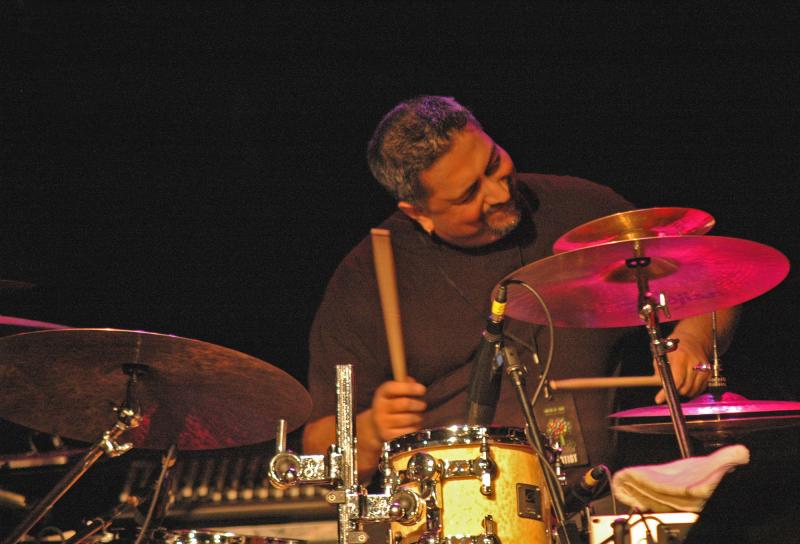 Ranjit Barot
Ranjit BarotAnd what a debut. Along with a host of fusion greats, and fellow Abstract Logix label mates including McLaughlin, Krantz and Garrison, the drummer recruited a number of outstanding Indian players, and two British musicians who come as something more of a surprise—saxophonist Tim Garland and pianist Gwilym Simcock. But listening to Garland's Dave Liebman-esque soprano solo, following electric mandolinist U. Rajesh' equally searing solo on the album's "T=0," it becomes clear just how right Barot's choices were as he gradually built his album from the ground up.
Of course, it wasn't possible to bring the large cast of Bada Boom to Raleigh; instead, Barot recruited fellow band mates from Human Element along with bringing the remarkable violinist Bala Bhaskar from India, to retain the album's Indo-centricity, even as Kinsey, Garrison and Tuncboyaciyan proved themselves absolutely capable of examining Barot's unique nexus of east and west.
 Bala Bhaskar
Bala Bhaskar Barot opened his show with two intimate duos featuring Bhaskar, but more than simply drum/violin duets (and, with players like this, that would have been enough), the drummer used programmed tracks to lend the pieces predefined shape, even as Bhaskar clearly warmed up during the set, moving from long, serpentine lines to light speed phrases with bowing so fast that, as his right hand became a blur, as the audience began to realize what they were seeing, responding with loud hoots, hollers and applause. Clearly, Bhaskar is another player deserving broader recognition—based on this performance alone, perhaps the most important Indian violinist since L Shankar—and, perhaps, an album on Abstract Logix wouldn't be untoward; but, at the very least, hopefully Barot will continue to work with him, and recruit him for his follow-up to Bada Boom.
In addition to being a powerhouse drummer, Barot is also a fine singer, and with another vocalist in the group (Tuncboyaciyan), there was even more opportunity to expand on some of Bada Boom's vocal tracks. Barot writes episodic pieces that travel broad terrains and, with only a relatively short rehearsal the day before—when, as Kinsey, Garrison and Tuncboyaciyan were challenged to learn his music—equal demands were placed on the drummer to pick up the Human Element repertoire. While parts of Barot's performance were redolent of a group winding its way through a series of difficult charts and performing them live for the first time, there was an inherent chemistry between Kinsey, Garrison and Tuncboyaciyan, as well as a clear and instantaneous connection between Barot and the Armenian percussionist/singer. Tuncboyaciyan's past work with artists including Oregon, keyboard legend Joe Zawinul and bassist Marc Johnson has always suggested a near-Puckish element of mischief; seen live, it became a defining characteristic.
 From left: Arto Tuncboyaciyan, Ranit Barot, Matthew Garrison, Scott Kinsey
From left: Arto Tuncboyaciyan, Ranit Barot, Matthew Garrison, Scott Kinsey In the same way that Machacek has channeled his clear love of Allan Holdsworth into his own unmistakable voice, so, too has Kinsey transcended any suggestions of imitation, to make his extension and extrapolation of the late Weather Report co-founder Joe Zawinul's concepts into something more personal and instantly recognizable. Like Zawinul, Kinsey used a vocoder to add, at times, a third voice to the group, though it was more in the sense of creating additional and often contrapuntal lines, rather than harmony or unison lines with either Barot or Tuncboyaciyan, and his astute ability to look for nooks and crannies in which to position well-conceived voicings or floating synth lines, brought a different perspective to Barot's music—as did Garrison's ability to combine punchy, deep in the gut supporting lines with upper register fights of remarkable fancy.
There was a lot of virtuosity going throughout Barot's performance, but never in excess and never doing anything but serving the music. When Krantz joined the group for an exhilarating version of Bada Boom's closer, "Origin," he kicked the set into high gear, where it stayed until the last notes faded to silence.

The drummer's set was a first, loud shot across the bow, making clear that Barot—a family man who shaped his career to put family first and now, with his daughter entering university in the United States, has the freedom to tour more to push his international career to the next level—is a drummer, writer and band leader poised for broader recognition.
Human Element
It's been far too long since Scott Kinsey—a busy player who has worked with everyone from guitarist Kurt Rosenwinkel and trumpeter Tim Hagans, to renowned fusion group Tribal Tech (which is in the process of finalizing its first album in ten years, to come in 2011)—released Kinesthetics (Abstract Logix, 2006), and while he began a follow-up recording, his intention to reduce Kinesthetics' larger cast to a smaller, consistent group of players resulted in the germination of Human Elements, a more egalitarian collective that starts where Zawinul Syndicate left off, but with plenty of differences as well.
 Scott Kinsey
Scott Kinsey Zawinul was noted for his "nobody solos and everybody solos" aesthetic—a clear foundation for Human Elements' modus operandi—there were clear solo features as well. Garrison—who, in addition to work on other Abstract Logix albums like Machacek's Improvision, has released a string of fine independent releases including the global-centric Shapeshifter (2004)—was front and center, and as much a lead voice as Kinsey's as he executed lines stunning breadth and speed. His ability to sweep across the neck of his five-string bass, combining vertical and horizontal lines with close voicings in a staggering demonstration of near-self accompaniment, created both a firm foundation with Barot and no shortage of exciting, snaking lines that moved in, out and around of Kinsey's equally quirky approach to keyboard orchestration.
What made the first day of the New Universe Music Festival so revealing—and something that's sure to continue on the second—was its dispensing of so many popular misconceptions about fusion. Yes, it was electric and electrifying; and yes, it was high on testosterone, instrumental virtuosity and high volume, high octane, high speed playing. But amongst the first three groups—from Machacek's cerebral writing and Barot's Indo-centric approach to western fusion, to Human Element's integration of world music concerns and booty-shaking grooves—there was proof that fusion crosses a wide spectrum, and that any attempts at reductionist pigeonholing are absolutely misinformed...and, quite simply, incorrect. With music as eminently danceable as Human Elements'—even when the meters were irregular—it was clear that words like bombast and excess simply ddn't belong in the same sentence as any of the groups so far. And any thoughts of this being simply music made to set a context and then get out of the way for endless soloing were belied by arrangements that evolved seamlessly, sometimes gradually, and always with an acute narrative sense.
 Matthew Garrison
Matthew Garrison Kinsey's engagement was clear from the start. Facing into the group, there was plenty of eye contact going on, and no shortage of acknowledging nods and smiles as well. The relentless grooves were enough to get the crowd moving; but it was the remarkable interplay between Kinsey, Garrison, Tuncboyaciyan and Barot—who did an outstanding job subbing for the group's regular drummer Gary Novak—that kept them engaged. Well-paced, with an ebb-and-flow dynamic that lent the performance shape and dramaturgy, if it's any indication of what the group's debut will be like when it finally hits the streets, Human Elements is going to be a group that makes some serious noise in fusion and world music circles.
Jimmy Herring
With all the knotty writing and odd meters abounding, it was a ballsy move for guitarist Jimmy Herring to open with Roy Buchanan's 12/8 chestnut, "Dreams." But while its structure was simple, in the hands of Herring's crack, well-oiled touring band—in addition to keyboardist Matt Slocum, bassist Neal Fountain and drummer Jeff Sipe (both already heard earlier in the evening as the fire in Alex Machacek's engine room)—it became a tour de force that clarified Herring's status as one of the best guitarists all too few have heard. Herring, a longtime member of Southern jamband Widespread Panic, possessed the attention to sweet tone that's made Jeff Beck such a success, but his language was far more advanced, as he also proved during a closing set to the first day of the New Universe Music Festival that went from Buchanan to John Coltrane, with a little Led Zeppelin thrown in for good measure.
 Jimmy Herring
Jimmy Herring Whether Herring was delivering soulful, searing and endlessly inventive solos to cover tunes like Zeppelin's enduring blues, "Since I've Been Loving You," or blowing the roof off the Lincoln Theatre with his own material, culled from Lifeboat (Abstract Logix, 2008) and some new material to boot, what defined his playing throughout the set was an unfailing ear for tone and a focused sense of construction that built each extended solo with dramatic peaks and valleys, and oftentimes multiple climaxes that, rather than leaving the audience spent, only raised the temperature and anticipation in the room.
This was clearly Herring's show in terms of maximum solo space, but his group was no less impressive. Fountain, alternating between his six-string bass and a funky Dan Electro four-string, proved the consummate player, adapting from Machacek's headier music to Herring's more inherently visceral repertoire without a single glitch. Busy when required, but keeping it simple when the song demanded, he locked into some absolutely evil grooves with Sipe, who also demonstrated a clear understanding and selfless approach that made the demands of the music paramount. The two build the greasier backbeat of Lifeboat's "New Moon" into a powerful show-stopper that featured one of Herring's best solos of the set, his combination of whammy bar and finger-driven bends sounding more like a slide guitar that, somehow occupying a timbral space not unlike Derek Trucks, may well have been an influence on the younger guitarist.
 Neal Fountain
Neal Fountain In a music that marries a jazz vernacular with the energy and power of rock, Herring's music sometimes leans more on the rock side of the equation, but if there were any doubts of his jazz cred—and hearing how he played in, around and through the changes of every piece, there shouldn't have been—they all disappeared when the group fired into Coltrane's classic "Impressions." Delivering a jaw-dropping modal solo, it was just one more example of a guitarist who demonstrated the less-is-more taste of Jeff Beck with Larry Carlton's tasty ability to navigate any context with a sweet tone given a sharper edge.
While encore demands earlier in the evening had to be declined to keep the evening on schedule, as the last band of the evening, there was no reason why the audience's scream, whistles and loud applause shouldn't have been satisfied, and so Herring came back for one final tune, where keyboardist Slocum—a rare player who still travels with an old clavinet, and it's beyond a good thing that he does—delivered a stunning solo that began on the decades-old instrument and, after exploring a range of choppy, wah-driven chords and almost impossibly fast double-fingered trills, moved dramatically to organ for a lead-in the Herring's final solo of the evening, and another stunner it was.
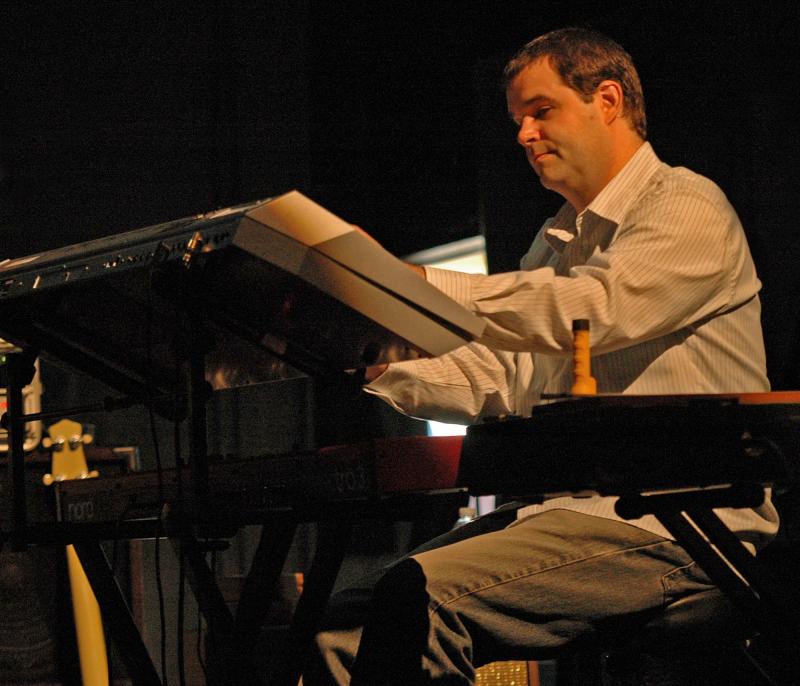
The good news is that Herring will be back on the second night of the festival, as a guest with Lenny White's group. With an already impressive line-up for the New Universe Music Festival's closing day, is one more vital reason to return to the Lincoln Theatre.
The New Universe Music Festival wraps up on its second day with performances by Wayne Krantz, Lenny White, John McLaughlin and The 4th Dimension, and a grand finale jam, a special tribute to John McLaughlin.
Visit Alex Machacek , Ranjit Barot, Scott Kinsey, Matthew Garrison, Arto Tuncboyaciyan, Jimmy Herring and The New Universe Music Festival on the web.
Photo Credits
All Photos: John Kelman
Day 1 | Day 2
Tags
New Universe Music Festival
Live Reviews
John Kelman
Big Hassle
United States
john mclaughlin
Anthony Jackson
Lenny White
Alex Machacek
Ranjit Barot
Gary Husband
Scott Kinsey
Matthew Garrison
Jimmy Herring
Wayne Krantz
Allan Holdsworth
Frank Zappa
Terry Bozzio
Trey Gunn
Jonas Hellborg
Shawn Lane
Shakti
Remember Shakti
Tim Garland
Gwilym Simcock
Dave Liebman
Oregon
Joe Zawinul
Marc Johnson
Weather Report
Kurt Rosenwinkel
Tim Hagans
Tribal Tech
Roy Buchanan
Matt Slocum
jeff beck
John Coltrane
Led Zeppelin
Derek Trucks
Larry Carlton
PREVIOUS / NEXT
Support All About Jazz
 All About Jazz has been a pillar of jazz since 1995, championing it as an art form and, more importantly, supporting the musicians who make it. Our enduring commitment has made "AAJ" one of the most culturally important websites of its kind, read by hundreds of thousands of fans, musicians and industry figures every month.
All About Jazz has been a pillar of jazz since 1995, championing it as an art form and, more importantly, supporting the musicians who make it. Our enduring commitment has made "AAJ" one of the most culturally important websites of its kind, read by hundreds of thousands of fans, musicians and industry figures every month.


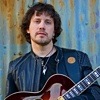
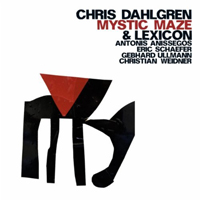




![Full Moon [Feat. New York Voices, Mark Egan]](https://s3.amazonaws.com/allaboutjazz/coverart/large/a07a6f1d5edcd6c801f0e1c3b527da37.jpg)

